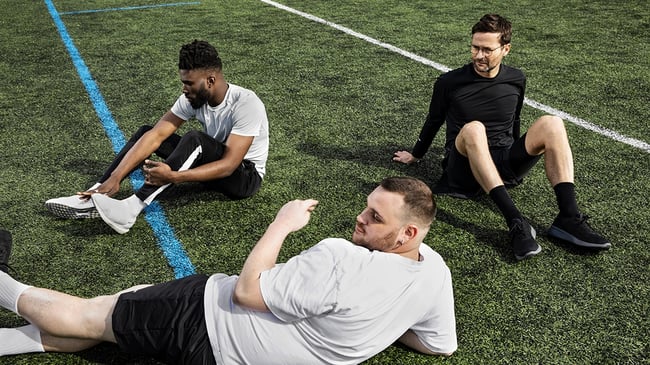

What's the Best Time to Exercise?
Photos Louis Canadas
Words Camille Claudet
Share the article on
For optimal workout results, it's important to find the right time slot.
Sommaire
You're highly motivated and have built up an unshakable commitment to exercise, but one question keeps nagging at you. It interferes with your goals and disrupts your workouts... What’s the best time of day to exercise? It’s a big question, but we're here to answer it, once and for all.
Rule No. 1
First and foremost, listen to your body and respect your natural rhythm. In any given 24-hour cycle, our muscle strength, endurance, and ability fluctuate, going through highs and lows. You experience daily rollercoaster rides without even realizing it. Have a think about how these cycles affect you, and align them with your goals. Ignoring this rule might make working out more challenging and could dampen your motivation, which is really the key to staying active in your sport.
The Early Risers' Club
The peaceful morning, the world just waking up, and you're face-to-face with your goals. Isn't this the perfect time to work out? It seems so. Exercising in the morning helps kickstart your body. It boosts energy, sharpens your mind, and revs up your metabolism. Working out also increases the production of endorphins and other mood-regulating hormones. For instance, cortisol stimulates activity and reduces stress by channeling it. Are you already setting your alarm for 6am?
All signs point to a good start to the day. If your goal is weight loss, mornings are prime time. Exercising in the morning usually means you're working out on an (almost) empty stomach, potentially burning 20% more fat than if you exercise after eating. When you work out on an empty stomach, your body first uses up its sugar reserves, then taps into fat. The results are guaranteed, but be careful of dizziness.
If your goals are different and you plan to work out for more than 15 minutes, have a sugary drink or a small breakfast with complex carbs: a banana, porridge, or rice pudding in small quantities. Choose gentle activities like a slow jog, swimming, or yoga. By evening, your sleep will improve, and you'll have a restful night.
Take It Easy
If you're more of a late riser, there's no need to drag yourself out of bed at 5am for marathon training. Forcing your body isn't beneficial and can disrupt sleep the night before your workout. Certain functions, like your heart rate, slow down during sleep, so your body needs time to get going again.
When your body isn't fully awake, your muscles are cold, so you'll need more time to warm up and should be careful not to strain them. If you choose to exercise on an empty stomach, your body will quickly demand energy, making it hard to maintain your effort.
For the End-of-Day Crowd
If it's advised to take it easy in the morning, can you go all out in the evening? The answer is yes. There's nothing better for releasing anxiety, reducing stress, and shaking off the frustration after a long workday.
By this time, you're no longer digesting, and your body is fully awake and alert. It's also when testosterone levels peak, which is great since it contributes to muscle tone. Blood sugar, muscle oxygenation, and body temperature are also at their highest. The higher your body temperature, the more effective your exercise. It's the time of day when your muscles and metabolism respond best to regular exercise. Perfect if you're aiming to break records.
When your muscles are ready, you gain more endurance, allowing you to push your body further. The result? Maximum flexibility: we're about 20% more flexible in the late afternoon. So, in the early evening, you can go for more intense activities: weight training, core exercises, or even boxing if you're feeling up for it. Just make sure to finish with a good relaxation session or stretching to wind down.
Don’t Get Too Motivated Too Late
After 7pm, opt for activities like cycling or running. After 8pm, you're crossing into the danger zone. The excitement from exercising can disrupt your sleep and reverse the body's temperature curve. It's best to finish your workout at least 3 hours before bedtime.
Choosing this time slot comes with a risk: losing motivation. Fatigue after a long day, the lure of Netflix, or a drink with friends... You could easily be swayed. It's also when gyms are most crowded, and in winter, with the night already closing early, you’ll need to find extra strength.
There isn't a one-size-fits-all answer; the best time depends on your natural rhythm, goals, and chosen activity. But most importantly, realistically, it depends on your schedule. The secret is consistency—find the right time, stick to it, and you'll progress without difficulty.

